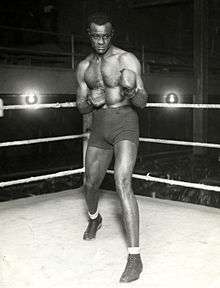Harry Wills
| Harry Wills | |
|---|---|
 Harry Wills in 1916 | |
| Statistics | |
| Real name | Harry Wills |
| Nickname(s) | The Black Panther |
| Weight(s) | Heavyweight |
| Height | 6 ft 2 in (1.88 m) |
| Nationality | American |
| Born |
May 15, 1889 New Orleans |
| Died |
December 21, 1958 (aged 69) New York, New York |
| Stance | Orthodox |
| Boxing record | |
| Total fights | 103 |
| Wins | 79 |
| Wins by KO | 49 |
| Losses | 10 |
| Draws | 4 |
Harry Wills (May 15, 1889 – December 21, 1958) was a heavyweight boxer who three times held the World Colored Heavyweight Championship. Many boxing historians consider Wills the most egregious victim of the "color line" drawn by white heavyweight champions. Wills fought for over twenty years (1911–1932), and was ranked as the number one challenger for the throne, but was denied the opportunity to fight for the title. Of all the black contenders between the heavyweight championship reigns of Jack Johnson and Joe Louis, Wills came closest to securing a title shot.
Boxing career

Wills fought many of the top heavyweights of his era. He defeated Willie Meehan, who had decisioned Jack Dempsey, Gunboat Smith and Charley Weinart. He also fought Luis Firpo in a match that ended in No Decision. Wills faced future heavyweight champion Jack Sharkey in 1926, and was being decisively beaten when he was disqualified. The next year, Wills was knocked out by heavyweight contender Paolino Uzcudun in a bout that signalled the end of his reign as a serious title contender. His final record was 75 wins (with 47 knockouts), 9 losses and 2 draws. In 2003, he was named to the Ring Magazine's list of 100 greatest punchers of all time.[1]
The top black fighters of Wills' era were forced to continuously fight each other, as many white fighters also drew the "color line". As a result, Wills fought the redoubtable Sam Langford 22 times. His record against Langford was 6 wins, 2 losses and 14 No Decisions, although the two losses were by knockout. He beat Langford three times for the colored heavyweight title, with Langford winning it back twice. (He was forced to vacate his third title when he fought Jack Sharkey in 1926 and was lost the bout due to a disqualification.) Wills also defeated colored heavyweight champ Sam McVey three times and fought two No Decision bouts with Joe Jeanette.[1]
Aborted 1926 Dempsey-Wills heavyweight title match
Midwestern boxing promoter Floyd Fitzsimmons rendered a check to Wills for his fee, but failed to produce even a downpayment for Dempsey's much larger fee for a bout between the two fighters, who had, in July 1925, signed an agreement for a 1926 title match, which never materialized as a result. Disagreement has existed among boxing historians as to whether Dempsey had avoided Wills– though Dempsey swore he was willing to fight him –as having said he would no longer fight Black boxers after winning the title. Wills twice attempted to sue Dempsey for breach of contract over the canceled bout, which had also been barred in New York State by Athletic Commissioner James Farley,[3][4][5] an early champion of African-American equal rights. A deadly race riot in the wake of The Johnson-Jeffries Fight (film depiction) also created reluctance to promote the match.[6][7]
Retirement
Wills retired from boxing in 1932, and ran a successful real estate business in Harlem, New York. He was known for his yearly fast, in which, once a year, he would subsist on water for a month. Wills admitted that his biggest regret in life was never getting the opportunity to fight Dempsey for the title. Wills was confident that he would have won such a match.
Wills died at Jewish Memorial Hospital in New York City of complications from Diabetes on December 21, 1958.[8]
External links
| Wikimedia Commons has media related to Harry Wills. |
| Awards and achievements | ||
|---|---|---|
| Preceded by Sam Langford |
World Colored Heavyweight Champion May 1, 1914 - November 26, 1914 |
Succeeded by Sam Langford |
| Preceded by Sam Langford |
World Colored Heavyweight Champion January 3, 1916 - February 11, 1916 |
Succeeded by Sam Langford |
| Preceded by Sam Langford |
World Colored Heavyweight Champion April 14, 1918 - October 12, 1926 |
Succeeded by George Godfrey Won vacated title |
References
- 1 2 3 "George Wills". BoxRec. Retrieved 8 August 2016.
- ↑ "Harry Wills". Cyber Boxing Zone. Retrieved 8 August 2016.
- ↑ Dawson, James P."Two Dempsey Bouts Signed By Rickard", The New York Times, July 17, 1925. Retrieved July 28, 2018.
- ↑ Weingarten, C. "The Myth of Dempsey-Wills", by Carl Weingarten, in The Bittersweet Science: Fifteen Writers in the Gym, in the Corner, and at Ringside, Carlo Rotella and Michael Ezra, Editors, The University of Chicago Press, Chicago, USA, 2017, pages 182 - 186. Retrieved July 28, 2018. ISBN 9780226346342
- ↑ Barnett, R.E., et al Contracts: Cases and Doctrine, by Randy E. Barnett and Nathan B. Oman. Aspen Casebook Series, Wolters, Kluwer, New York, 2017, pages 88-89. Retrieved July 28, 2018. ISBN 9781454885641
- ↑ Barak Y. Orbach. "THE JOHNSON-JEFFRIES FIGHT: 100 YEARS THENCE: THE JOHNSON-JEFFRIES FIGHT AND CENSORSHIP OF BLACK SUPREMACY" (PDF). Law.nyu.edu. Retrieved 2016-01-09.
- ↑ BOXREC "Harry Wills", BOXREC.com, Retrieved July 28, 2018.
- ↑ "Harry Wills Dies at 66", Democrat and Chronicle", Rochester, New York, pg. 29, 22 December 1968